Amid divisions, Jews on the left find unity mourning victims and warning against Gaza ‘genocide’
Fallout from bloodshed in Israel opened ‘fault lines’ on the Jewish left. Israel’s violent response brought it back together
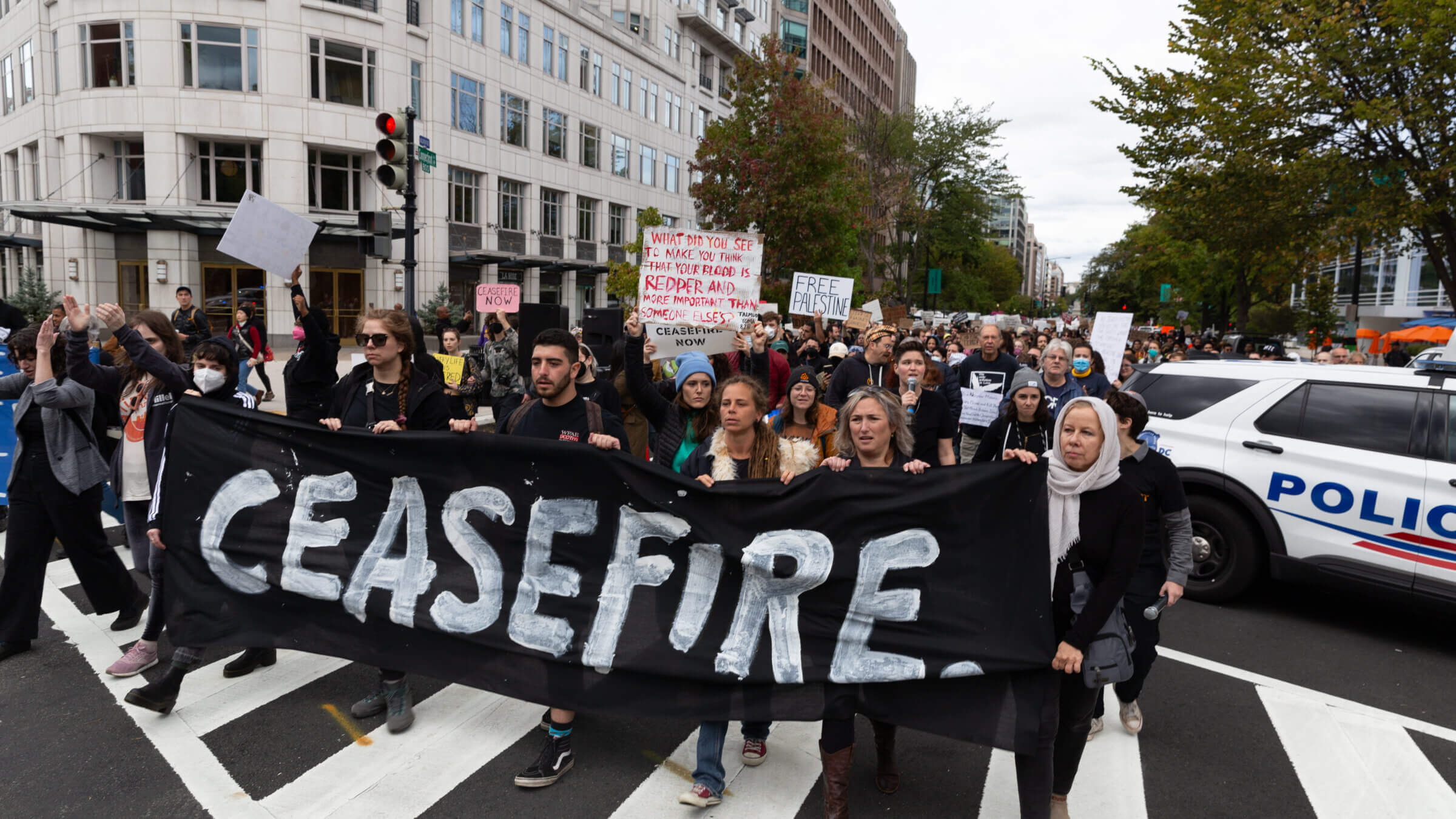
Demonstrators calling for a cease-fire in Gaza and Israel march to the White House during a protest organized by IfNotNow and Jewish Voice for Peace, two groups that typify the Jewish left, which has been riven by divisions over how to respond to the deadly Hamas attack against Israeli civilians. Photo by Matthew Litman/Special to the Forward
WASHINGTON — Looking out on the crowd at Farragut Square, a block from the White House, one could be forgiven for missing the divisions newly flaring among progressive Jews. More than 1,500 people, most of them young, packed the park for a rally calling for a cease-fire in Gaza. A handful waved Palestinian flags and many more carried signs with slogans like “not in our name” and “apartheid Israel — complicit USA.”
“This is an unprecedented moment of unity for the Jewish left,” Eliana Golding, one of the event’s organizers, told the crowd.
And it was. People had traveled from as far as California to demonstrate outside the White House, with dozens agreeing to block the building’s entrances, risking near-certain arrest. It was the largest progressive protest organized by Jews since early demonstrations against the Trump administration more than five years ago.
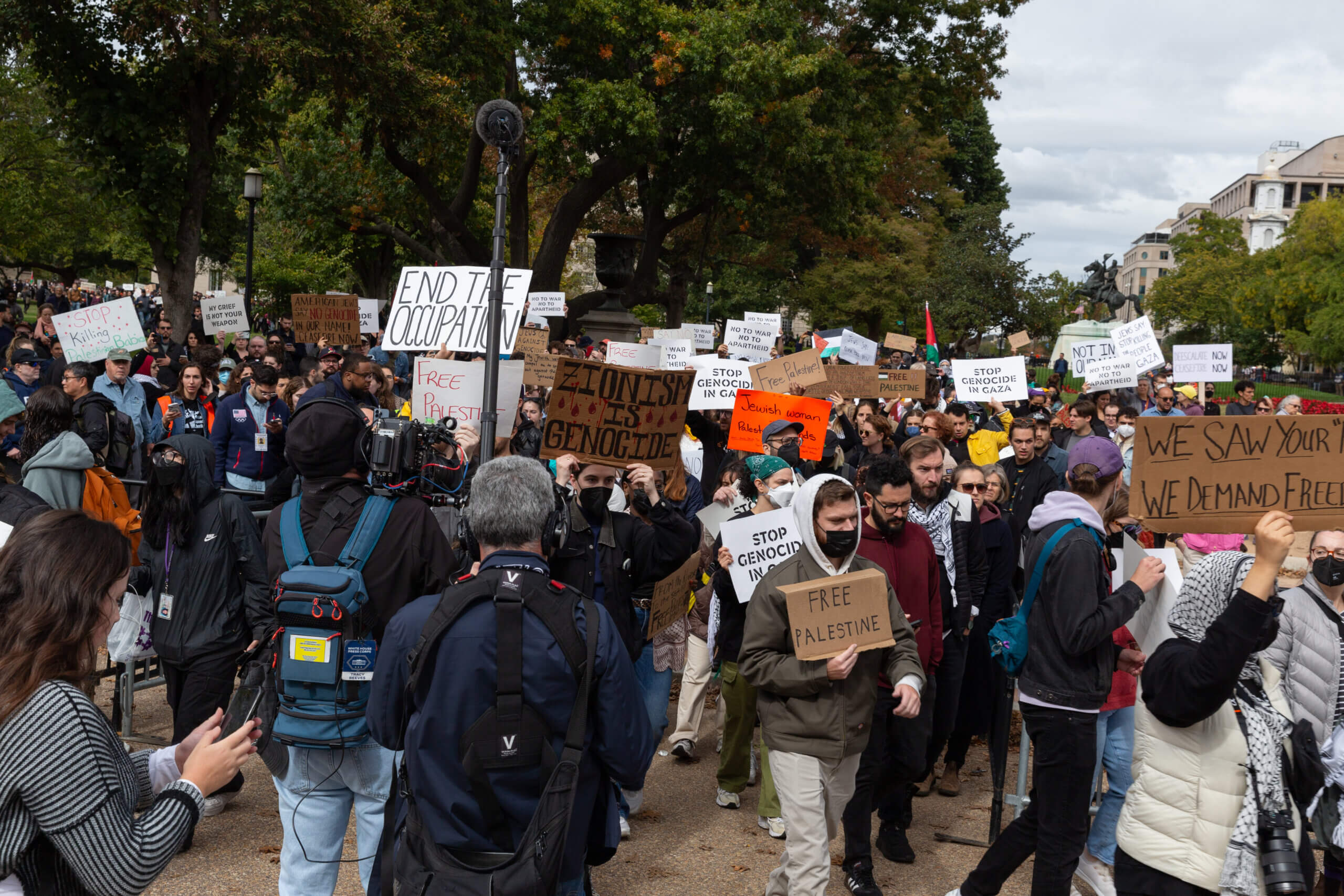
The gathering Monday stood in stark contrast to the way the vast majority of the organized Jewish community has responded to Israel’s war with Gaza. Even more liberal voices within that community, like that of the Reform movement, have rallied around a message of solidarity with Israel and avoided the kind of sympathy they showed for Palestinians during the last round of violence two years ago.
But the crowd had come together despite deep questions over how the Jewish left — a loose amalgamation of individuals and organizations, typified by IfNotNow and Jewish Voice for Peace, which organized Monday’s rally — should respond to the deadliest terrorist attack in Israeli history. On Oct. 7, Hamas militants rampaged through southern Israel, killing more than 1,400 Israelis and taking around 200 hostages. Israel quickly declared war on Hamas and began bombing Gaza in airstrikes that have since killed an estimated 3,000 Palestinians.
If the pro-Palestine Left is unable to vocalize in this moment a principled opposition to massacre of Israeli civilians- even as we affirm the right of Palestinians to resist brutal apartheid- we are abdicating the values of justice, human rights & dignity we have long espoused https://t.co/D3NN506wUQ
— Ben Lorber (@BenLorber8) October 9, 2023
Reaction to the bloodshed by Palestinian activist groups during the first weekend of the war, including celebrations of the Israeli deaths at rallies and images glorifying the terrorists on social media, caused much of the rancor among Jews on the left of the political spectrum, who take a diverse set of positions on Zionism but are united by strong support for Palestinian rights and harsh criticism of the Israeli occupation.
“You started hearing, ‘Resistance is justified when people are occupied,’” recalled Ben Lorber, a researcher of white supremacist movements and longtime Palestinian solidarity activist. “That was just something I couldn’t stomach.”
Lorber, who once worked as the national campus organizer for Jewish Voice for Peace, which is an anti-Zionist group, went viral on X (the platform formerly known as Twitter) for sharing his concern that the “pro-Palestine left” was “abdicating the values of justice, human rights and dignity we have long espoused.”
Arielle Angel, editor of the left-wing journal Jewish Currents, told the audience at a Jewish journalism event at Stanford last week that her readers and staff were in crisis: “It has exposed fault lines in the Jewish left that are very, very new and raw,” she said.
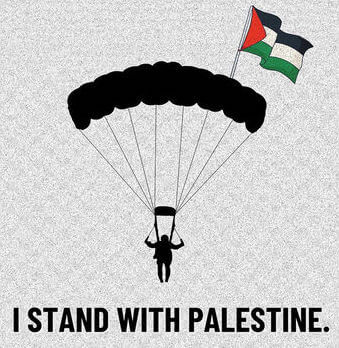
Debate raged over whether to call Hamas terrorists; whether Israel was responsible for the violence; and whether Israeli victims were truly innocent. But by the end of last week, the mood seemed to shift. As the extent of Hamas’ atrocities became clear — families murdered in their homes, bodies torched, peace activists kidnapped — some prominent voices started walking back their praise for the attack.
The Chicago chapter of Black Lives Matter, for example, deleted an image of a paragliding Hamas militant, and said it wasn’t “proud” of the graphic, while Rivkah Brown, a British journalist, deleted a post saying that people should celebrate the attack and apologized.
At the same time, the Jewish left coalesced around something they could all agree on: the need for a cease-fire between Israel and Hamas, primarily meaning that Israel needed to stop its airstrikes in Gaza and abandon the planned ground invasion.
And they had a new rhetorical tool to make their case, one that has helped to bury some of the divisions that emerged in the immediate aftermath of the Hamas attack.
“We cannot get caught up in petty b——– right now,” Angel told me two days after her panel remarks about a crisis on the left. “We need to be talking about the fact there’s an imminent genocide.”
‘Genocide’ becomes watchword on the left
It took years — and a consensus by Israeli and international human rights groups — for organizations like IfNotNow, the Jewish group opposed to the Israeli occupation that co-organized Monday’s White House rally, to begin using the term “apartheid” in reference to Israel.
It took only a matter of days for IfNotNow and others on the Jewish left, including Jewish Voice for Peace and Jews for Racial and Economic Justice, to adopt the term “genocide,” which according to the United Nations involves targeting an ethnic or religious group “with intent to destroy” it wholly or partly.
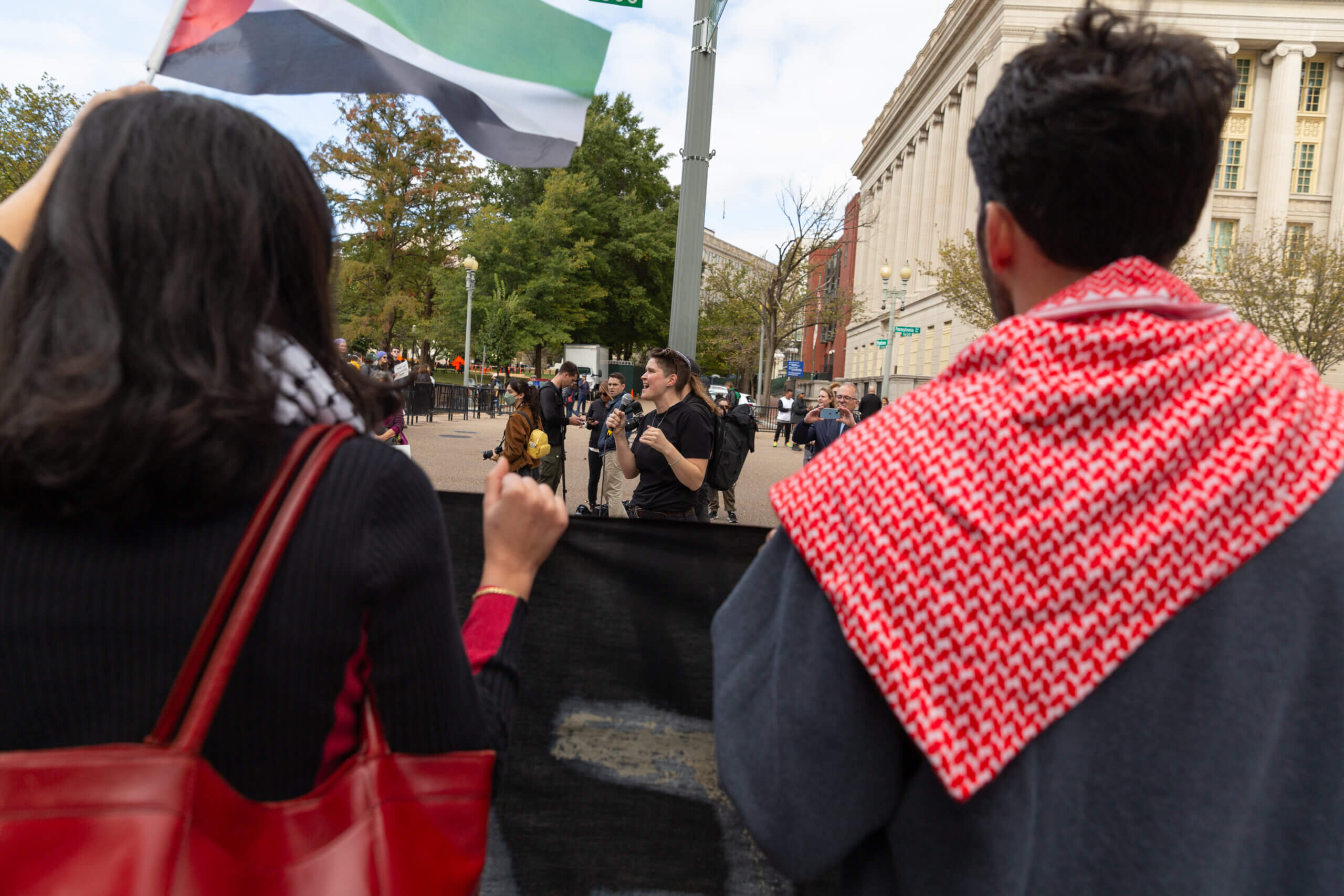
At the Monday rally that began in Farragut Square, Golding told those assembled: “Jews deserve to be safe. But there is no safety in genocide.”
The crowd chanted along: “No! Safety! In! Genocide!”
Raz Segal, an Israeli Holocaust scholar at Stockton University, a regional public institution in New Jersey, called Israel’s war in Gaza “a textbook case of genocide” in an article for Jewish Currents that has been widely shared on the left.
Segal acknowledged in an interview that there were not many people in his field of genocide studies who would characterize Israel’s war in Gaza as he did — a clear genocide in progress — though he pointed to a statement Tuesday signed by 800 scholars warning of a “potential genocide in Gaza.”
IfNotNow’s leadership has alternated between describing Israeli violence as an active genocide and warning that it could become a genocide if left unchecked.
These accusations escalated Tuesday after a hospital in Gaza was bombed and Israel traded accusations of responsibility with Hamas.
“These atrocities must stop,” Jewish Voice for Peace said on X after the bombing. “This is genocide.”
‘This is not rhetoric’
As IfNotNow and its allies accuse Israel of genocide, they are recalibrating the discourse to frame Israel as the primary perpetrator of atrocities in the conflict, despite the unprecedented terrorist attack against Israeli civilians.
But even if the emphasis on stopping “genocide” has the effect of focusing energy on calls for a cease-fire — and away from internecine debates on the left — proponents of the term insist it’s not a cynical tactic but rather a grim reflection of reality.
Eva Borgwardt, the spokesperson for IfNotNow, said Israel has a consistent track record of responding to terrorist attacks by killing far more Palestinians than there were Israeli victims — and the worse the terrorist attack, the more brutal the Israeli response.
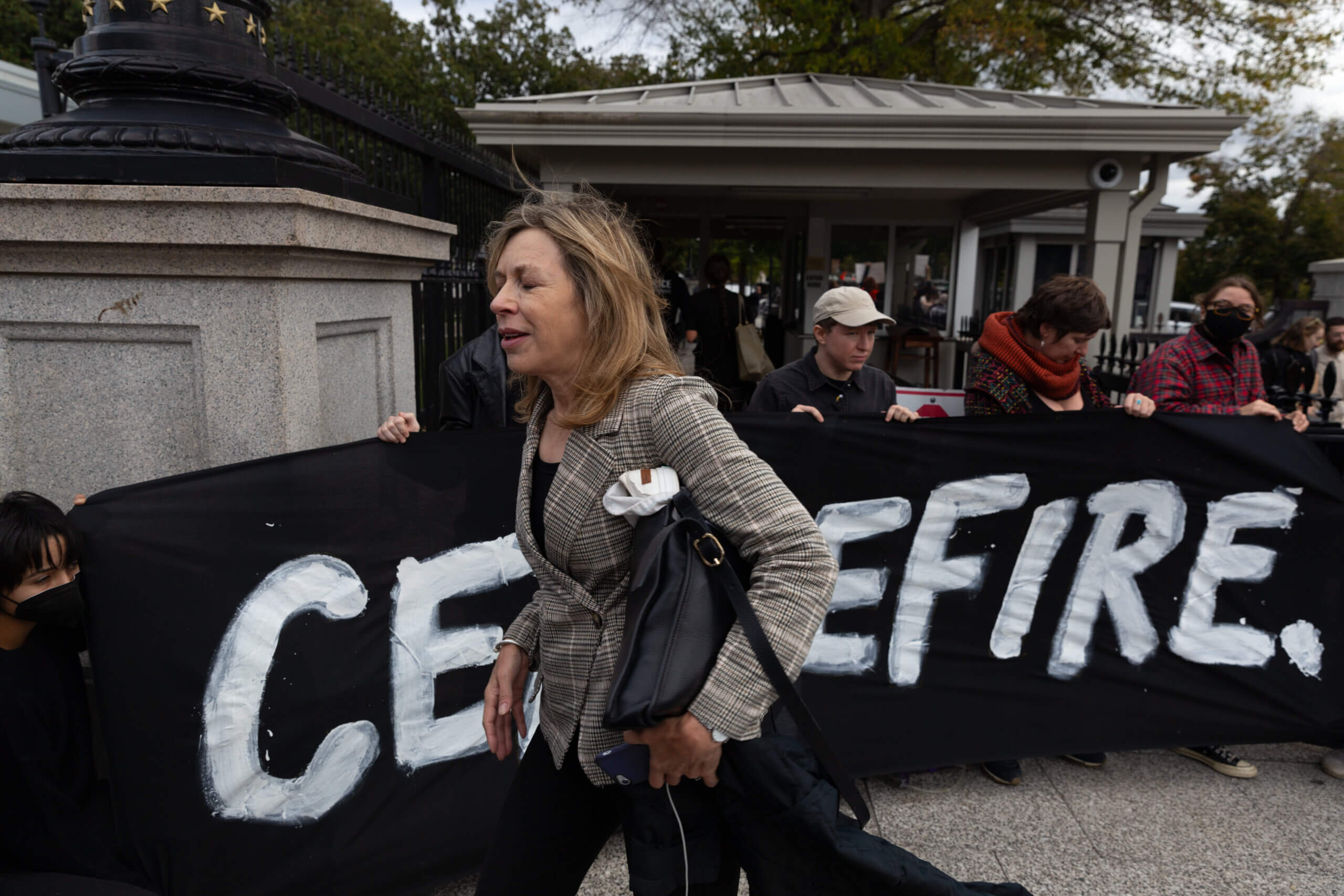
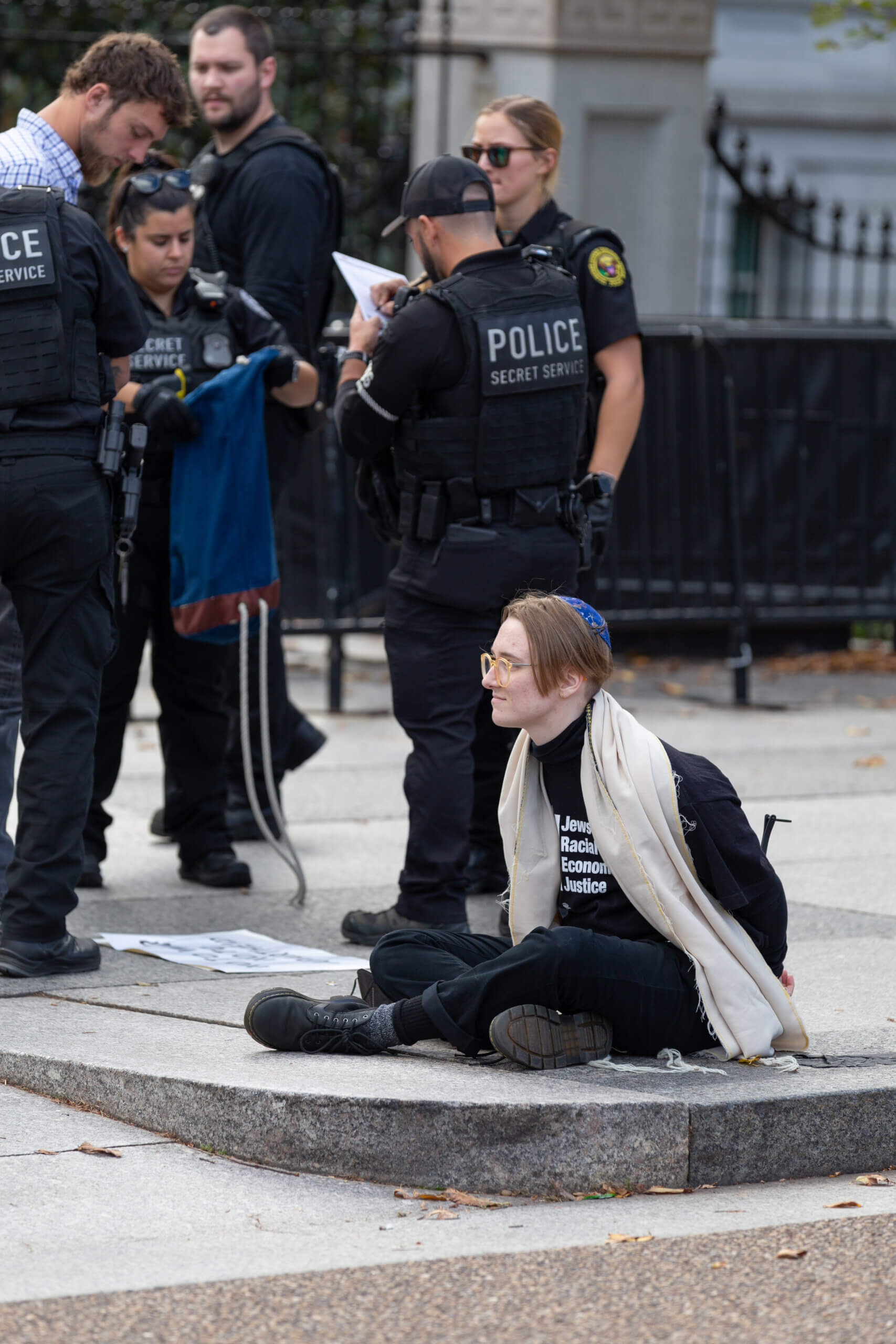
“The Israeli government has made clear that its response to the massacre of 1,000 will be unheard of in its scale and devastation for the people of Gaza,” she said. “This is not rhetoric for the left, this is about what is going to happen to millions of people.”
“Our movements are so used to not even being allowed the space to grieve deaths of Israeli loved ones because we have to shift immediately into fear about what is coming for Palestinians,” she added.
To bolster their use of the term “genocide,” Borgwardt and others have pointed to rhetoric from top Israeli officials that speak to an intent to wipe out innocent Palestinians in Gaza. Those statements include a remark from Israel’s defense minister saying that the country was fighting “human animals,” Prime Minister Benjamin Netanyahu referring to the war as a conflict “between the children of light and the children of darkness” and Isaac Herzog, Israel’s president, saying of Gaza that “it is an entire nation out there that is responsible.”
Concern that Jews may ‘shut off’
Even in the face of unity over calls for a cease-fire at Monday’s action, which involved a short march to the White House and hours of civil disobedience during which 50 protesters were arrested for blocking the building’s entrances, there are still disputes over terminology.
Rabbi Mordechai Liebling, the former leader of the Reconstructionist movement, said he believed that Israel’s actions might technically meet the international legal standard of genocide. But Liebling, the son of Holocaust survivors, said he also understood the strong emotions that the term evoked.
“The rhetoric of genocide is very problematic in the Jewish community,” Liebling said on the sidelines of the demonstration. “The shock wave it creates is very important, but I get concerned that Jews shut off and won’t listen.”
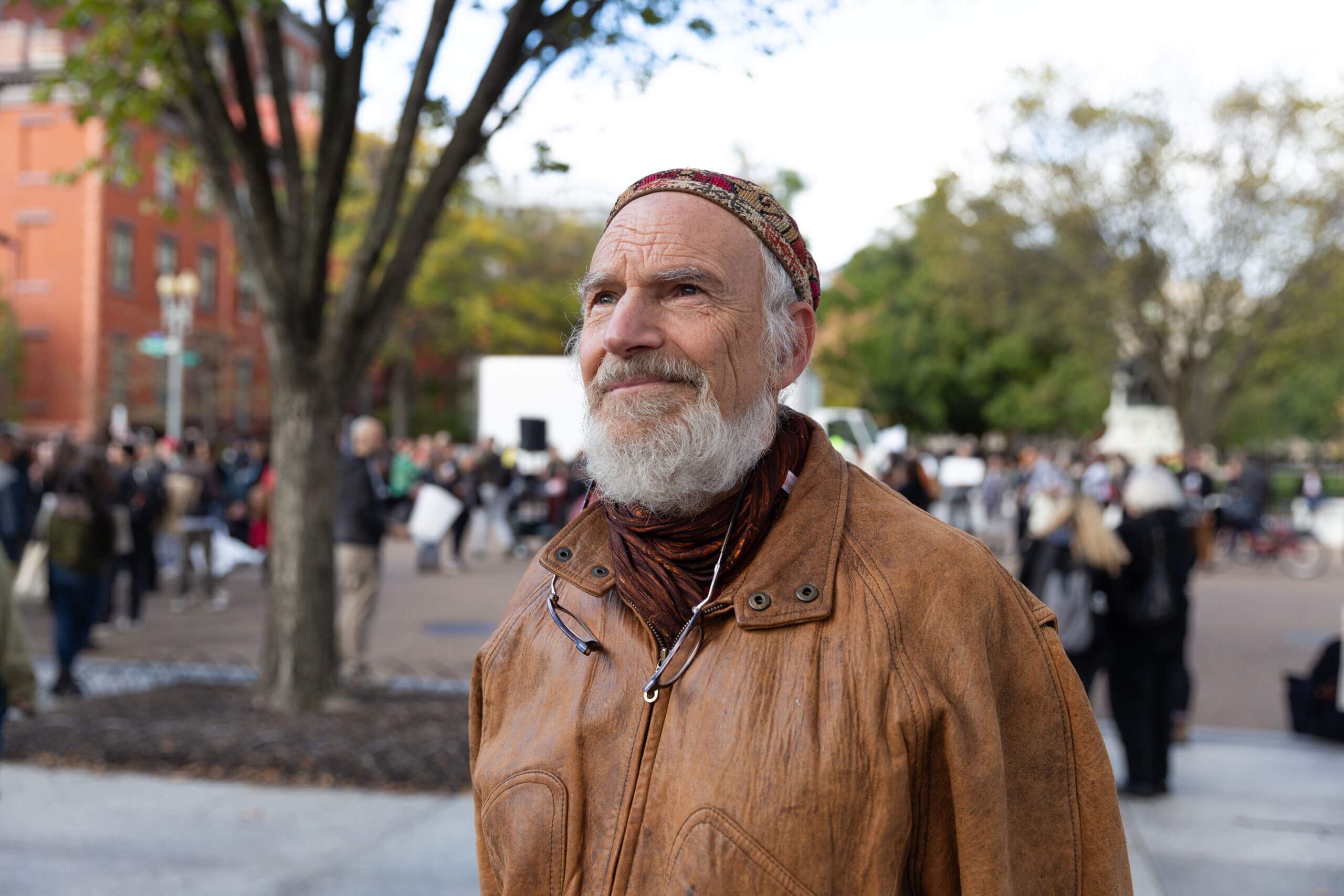
Wallace Shawn, the stage and screen actor from The Princess Bride, among other films, attended the protest but demurred when asked whether he thought Israel was committing a genocide.
“These are words,” Shawn said in an interview at the protest. “It’s a series of horrifying war crimes. It’s very, very extreme.”
Wounds remain open
Many on the Jewish left acknowledge that even as they protest what they see as unprecedented Israeli violence against Palestinians, they are still grappling with the failure by some of their peers to condemn the murder of their loved ones in Israel.
“The left, much like the rest of the world right now, struggles to hold the complexity of emotion while also making a clear political demand,” said Rabbi Jessica Rosenberg, who helped craft a clergy statement about the conflict for Jewish Voice for Peace.
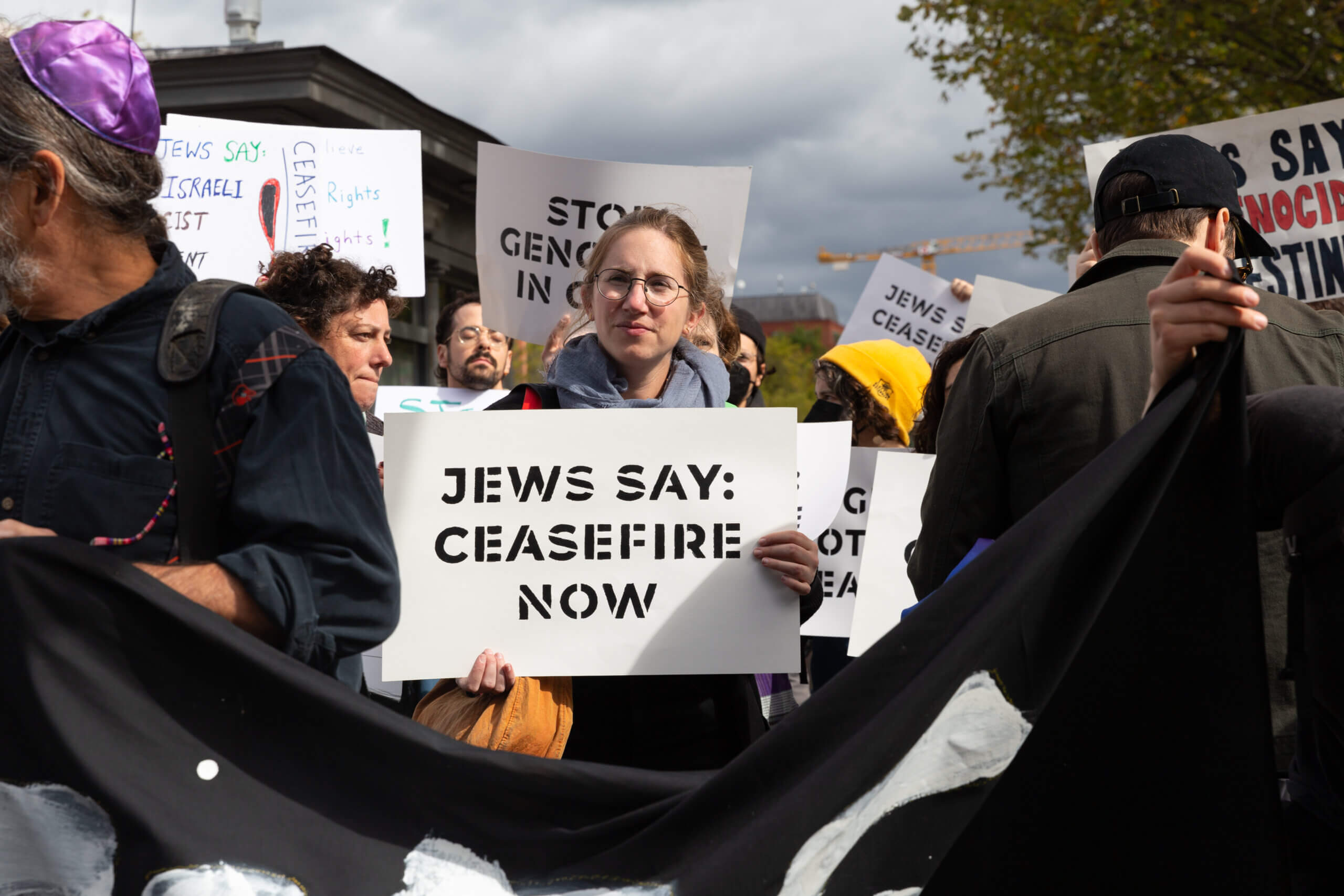
But there was widespread consensus among the small number of Jewish organizations calling for de-escalation and cease-fire in Gaza that the time for conversations with those who failed to condemn the murder of Israeli civilians would come after the current round of violence was over.
“We’re all just in an incredibly raw place right now — if I were Palestinian, I would not have attention for this conversation,” said Lorber, the left-wing activist and researcher. “I would be glued to social media, talking to my family and worried about my family facing genocide.”
A message from our Publisher & CEO Rachel Fishman Feddersen

I hope you appreciated this article. Before you go, I’d like to ask you to please support the Forward’s award-winning, nonprofit journalism so that we can be prepared for whatever news 2025 brings.
At a time when other newsrooms are closing or cutting back, the Forward has removed its paywall and invested additional resources to report on the ground from Israel and around the U.S. on the impact of the war, rising antisemitism and polarized discourse.
Readers like you make it all possible. Support our work by becoming a Forward Member and connect with our journalism and your community.
— Rachel Fishman Feddersen, Publisher and CEO



















